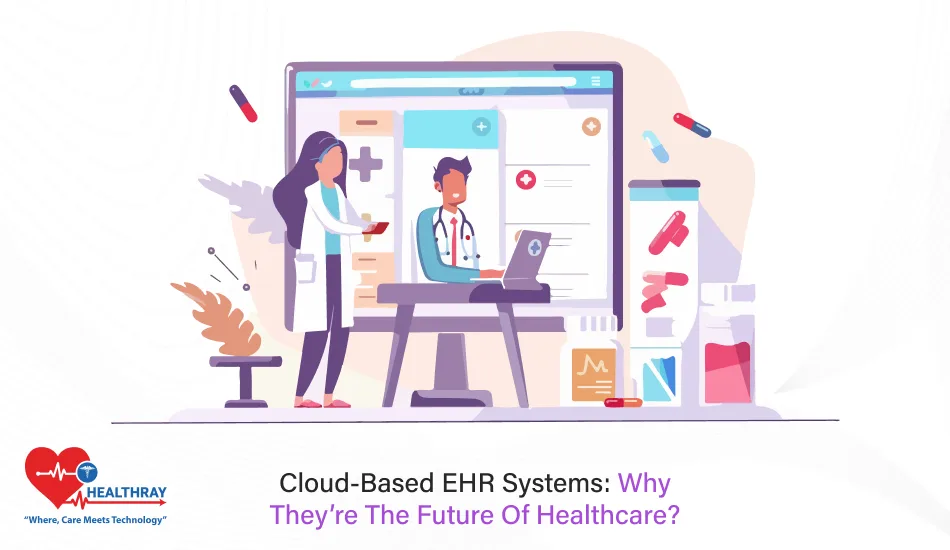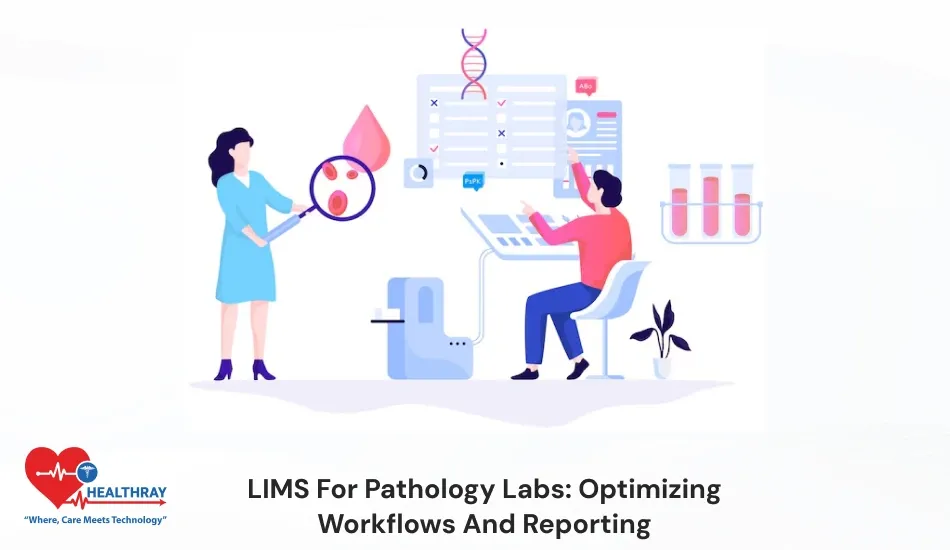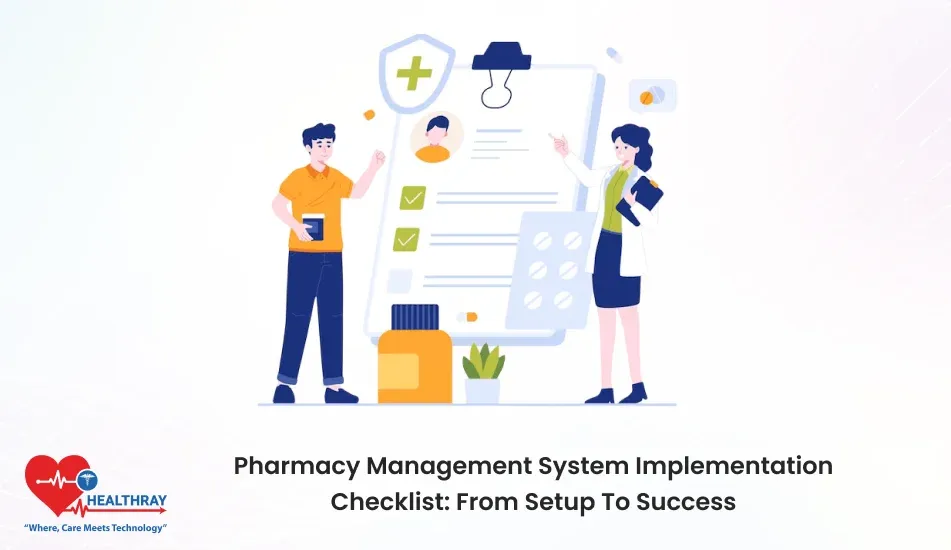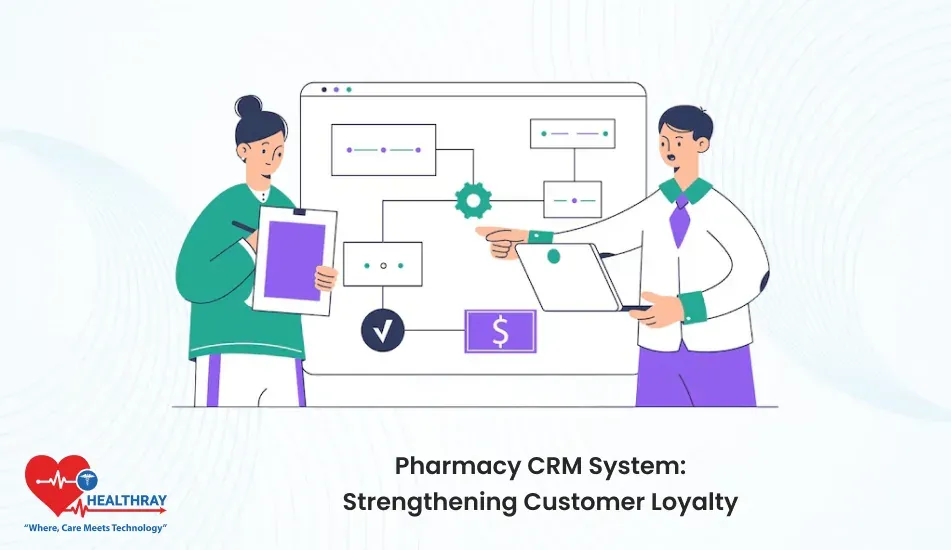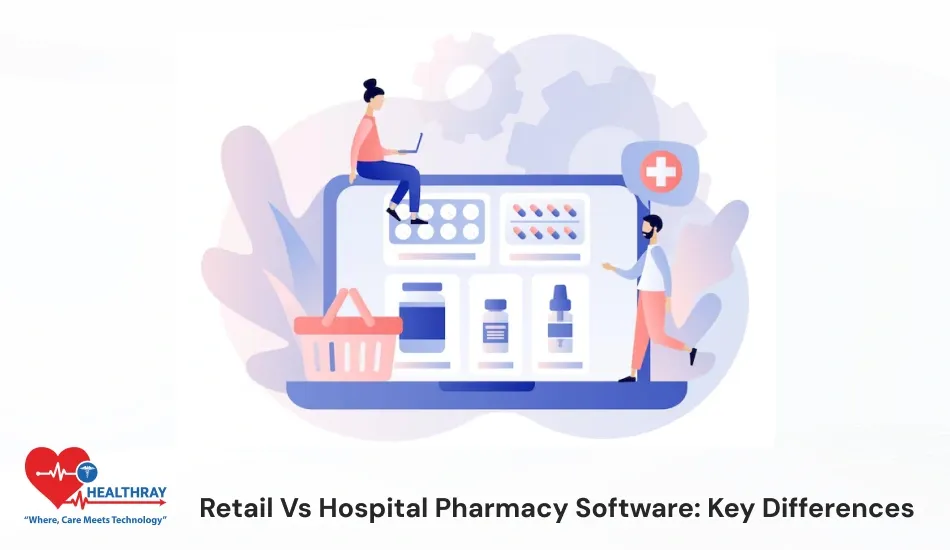Summary
The health care world is trying to move to smart, fast and connected care. At the heart of its transformation is a cloud-based EHR system, because it is flexible, secure and provides real-time access to patient data.
It empowers doctors, clinics and patients from cutting costs to fostering collaboration. This technology is bringing the healthcare business up to date and providing newness via AI, analytics, interoperability, etc. The future isn’t coming; the future is here, and it lives in the cloud.
Introduction
Let’s face it! Health care is not what it used to be.
Paper charts, clunky tabs and file cabinets are a thing of the past. Now, everything’s smarter, faster, and way cooler! That’s where cloud-based EHR systems come in.
They don’t simply warehouse information about patients; they link doctors, patients, and data in ways we have not been able to do before. With the click of a button, doctors can have patient information at their fingertips quite literally anywhere.
And here’s the exciting part: those systems are already here. From cutting costs to improving accuracy, they are rewriting the rules of modern healthcare. They also help keep data safer than ever.
So, if you’re wondering why everyone is so excited about them, hang tight. In this blog post, we are going to get into how cloud-based EHR systems are not just shaping the future of healthcare but actually making it sharper, simpler and way more connected.
What Is a Cloud-Based EHR System?
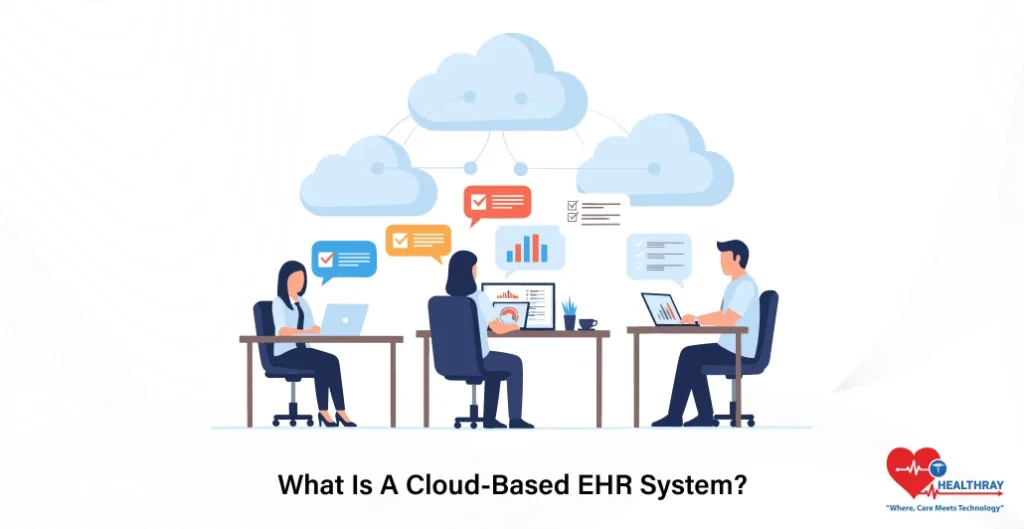
Imagine strolling into a clinic where, instead of files piled in mountains, everything is a few clicks away. The doctor opens a screen and there is your medical history, lab results, prescriptions all instantly. That’s the beauty of a cloud-based EHR system.
But what does cloud-based really mean?
First, the cloud is like super-secure online storage for your data, rather than something on your own computer. It’s like a virtual filing cabinet that never loses a paper and never fills up. So, a cloud-based EHR system is a digital platform that stores, manages, and secures patient health records on remote internet servers.
Cloud-based EHR software is more than storage; it’s a connection. EHR software allows teams to work together, communicate securely, and make decisions more rapidly. No more running between departments for the reports. Everything syncs in real time, allowing doctors to focus on what matters patients.
The best part? A new modern EHR for speciality clinics customises everything for a particular need. Be it dermatology, oncology or paediatrics, each clinic receives tailored tools. Instead of one-size-fits-all, the system bends to your workflow.
Why Healthcare Is Moving to the Cloud?
Hospitals and clinics are trading paper chaos for cloud-based EHR software, and the change feels nothing short of magical.
So why the big shift?
Because technology is rewriting how we care for patients. With the software for EHR, suddenly medical teams were looking at up-to-the-minute patient data, instantly no lag time, no confusion. They can update a patient’s chart, and everyone with access can see it in seconds.
Also, it is now incredibly easy to share such data using modern interoperable EHR platforms. A specialist, a lab, and a hospital can all access the same information in real time. That kind of connectivity translates into fewer mistakes, faster diagnoses, and easier treatment experiences. Also, cloud-based EHR systems ensure that sensitive data is secure, accessible, and up to date.
The cloud made medical records not dusty papers but digital instruments, living and breathing. And with every click, it’s making care smarter, faster and far more human.
Why is the Cloud-Based EHR System the Future of Healthcare?
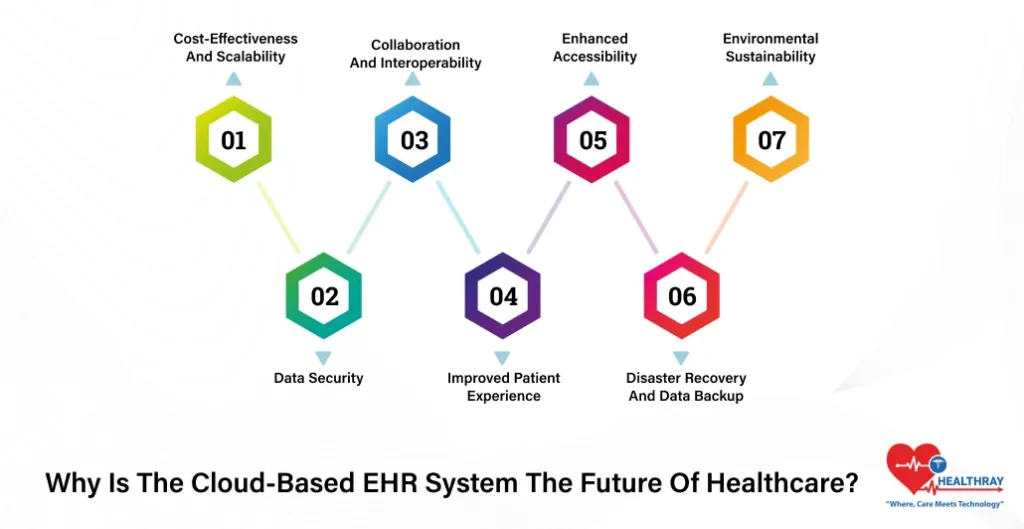
Here’s a look at how cloud-based EHR systems are driving the next great leap forward in patient care.
Cost-Effectiveness and Scalability
Let’s have the money talk, shall we?
Hospitals and clinics used to throw money at heavy servers, IT teams and regular hardware upgrades. However, those days are fading away. With a cloud-based EHR system, you pay for what you need, and scale when you grow.
It is like going from purchasing a whole airplane to buying a flight ticket when you need to fly. Clinics no longer have to maintain costly data centers. The EHR software is cloud-based and therefore does not require large internal systems.
Even better, the cost of updates, maintenance, and tech support comes down dramatically. You don’t have to call tech teams in every week to fix bugs. The EHR program updates itself, saving time and money. Small clinics can now use the same advanced tools as big hospitals without breaking their budget. From an infrastructure standpoint, multi cloud management platforms further support this model by helping healthcare providers manage resources across multiple cloud environments efficiently, improving cost control and reliability.
And here is the beautiful part, scalability. The systems grow with the clinic. Cloud platforms are easily scalable, whether you are adding new branches or new doctors. With regards to EHR for speciality clinics, scalability is the holy grail. Cardiology, paediatrics, and dermatology can all add their own tools without reinventing the wheel. So, when healthcare scales up, the software for EHR also scales with it.
Data Security
Patient data is sacred and must be protected by health care at all costs. Cloud storage is still regarded as risky by many. But cloud-based EHR systems are, in fact, often more secure than their on-premise counterparts.
In what way? Because cloud providers have top-level encryption, firewalls, and real-time monitoring. They protect information fiercely. And while the old systems could fail or be hacked, the cloud software for EHR has multiple layers of protection. If one wall is breached, the next remains up.
Compliance is also simplified. The EHR software automatically complies with healthcare standards such as HIPAA. Hospitals aren’t required to manually monitor every rule or update. The system does it all, keeping patient data secure and compliant.
For EHR for speciality clinics, this is gold. Each speciality deals with its own, often highly personal, information. Dermatology images, oncology results, and psychological records are made secure and available only to the authorised professional through cloud systems.
Plus, security patches come instantly. You don’t have to wait months to patch vulnerabilities. Its electronic health record software updates automatically, so each clinic is a version ahead of cyber hackers.
And yes, the cloud not only stores data but also protects it.
Collaboration and Interoperability
Imagine you go to one hospital for tests, another for treatment and a specialist for follow-up. Each has a part of your medical puzzle. In the past, they had trouble making those two connections. That’s where interoperable EHR systems come to the rescue.
Cloud-based records systems enable hospitals, labs and clinics to communicate in real time. A cardiologist can access outside lab results in seconds. A radiologist can upload images, and a surgeon can see them instantaneously.
So, whether you are in a private clinic or a large hospital chain, your data flows on their platforms. EHR software connects everyone involved with the patient’s care.
For EHR for speciality clinics, this connection is a game-changer. A neurologist can pull someone’s lab work from another clinic. A paediatrician can connect with a geneticist in an instant. This real-time collaboration leads to better diagnoses and fewer mistakes.
Also, an interoperable EHR is useful in an emergency. Doctors can instantly access entire histories of patients. That means faster care, less risk and better outcomes.
Improved Patient Experience
Let’s put the focus back where it belongs, on patients. Back in the day, patients waited weeks for reports, retests and filled out endless forms. But now, cloud-based EHR systems simplify life for everybody.
Patients can access their records anywhere and at any time. They can make appointments, see test results, and send notes to their doctors via portals. Now that’s convenience.
The EHR software gives healthcare teams comprehensive, real-time views of every patient’s journey. That translates into fewer mistakes and faster decision-making. A patient doesn’t have to give his medical history over and over; it’s there, organised and available.
Even the EHR for speciality clinics adds a personal touch. In an ophthalmology clinic, for instance, one can track how vision problems progress over time. A cardiology center can send exercise and medication updates directly to a patient.
The EHR software connects healthcare into a seamless experience. It’s not just about treatment anymore; it’s about engagement, empowerment, and understanding.
And here’s the kicker: Patients feel cared for because they are kept informed. Interoperable EHR systems make every encounter easier, clearer and less stressful. When patients feel included, there is more trust and better care.
Enhanced Accessibility
Imagine a doctor who is flying to a conference and checks on patients’ charts on the plane. Or a rural clinic getting expert advice from a big city hospital. That is the power of accessibility through cloud-based EHR systems.
Unlike legacy systems that operated on physical servers, cloud services allow doctors to log in from anywhere at any time. They just need internet access, and they can operate seamlessly on tablets, laptops, and even smartphones.
Such EHR software is also a resource for healthcare workers in the context of emergencies. Think about a natural disaster or an accident teams can access records right away, even from temporary setups. So, the future of healthcare has no walls and no wires.
Disaster Recovery and Data Backup
Let’s be real, disasters happen. Data is lost when servers crash or the power goes out. In a normal world, that meant chaos. But with cloud-based EHR systems, recovery takes minutes, not months.
All data is automatically backed up in several secure locations. If one server fails, the other copy remains safe elsewhere. The EHR software continues to run without interruption.
That reliability is priceless for EHR for specialty clinics. Whether to a dental clinic, a fertility center, or a cancer care unit, patient data is protected and recoverable. And the best thing? No manual backups! The system runs on the back end. That means fewer IT headaches and more focus on patients. In short, cloud technology transforms a potential disaster into a minor blip.
Environmental Sustainability
Let’s talk green. Health care generates mountains of paper waste every year, charts and forms and prescriptions and reams of copies. But cloud-based EHR systems are helping the planet breathe a little easier.
Moving data to the cloud greatly reduces the use of paper in hospitals. The EHR software also obviates physical storage space and the need for printing supplies. Everything is digital and a few clicks away.
Instead of powering a multiplicity of on-site servers, organisations share efficient cloud infrastructure. That cuts electricity use and carbon emissions. Smaller clinics can be almost paperless, saving money and space, and being environmentally friendly. The EHR software also supports remote work and telehealth, which means less commuting and less fuel for driving.
And when interoperable EHR systems link facilities, documents do not need to be couriered or physically transported. Data moves through the cloud, not on highways.
So yes, going digital is not just smart for health care, it is smart for Earth. The EHR software shows that you can save lives and save the planet, too.
Conclusion: The Future Looks Cloudy!
The future of healthcare looks cloudy, and that is fantastic news!
The cloud in modern cloud-based EHR systems is not simply a storage medium; it is an intelligent, dynamic organism that adapts and learns. AI and analytics are extracting insights from patient information.
Doctors won’t just treat but will anticipate. Software for EHR will analyze trends, recommend personalized care, and enhance accuracy in exciting ways. And interoperable EHRs that allow real-time data sharing will integrate all providers into a single, smart healthcare ecosystem.
What will this lead to? Speedier diagnosis, smarter decision-making and proactive patients. The cloud isn’t just the future; it is the future of revolutionising healthcare.
